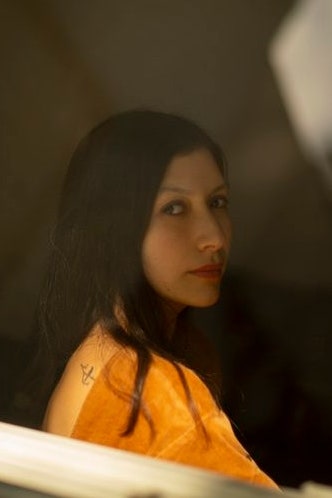
If you have yet to dive into Jazmina Barrera’s Cross-Stitch – a young mother’s reflections on youth, the passage of time, and the meaning of female friendship, blending Sally Rooney-esque interpersonal chaos with a clean, graceful prose style – in its original Spanish, then you’re in luck.
An English-language version of the novel, translated by Christina MacSweeney, is due out this November, making this the perfect time to familiarise yourself with Barrera’s body of work. (No pun intended, despite the fact that one of Barrera’s most powerful works – Linea Nigra, from 2022 – is an exploration of childbirth and parenthood that writer Nikki Shaner-Bradford has described as “a study of the embedded life of the writer, one of flesh and weather and thought and sound”.)
Recently, Vogue spoke to Barrera about preparing to see her debut novel out in the world in English, working with other writers to publish a wide range of modern Mexican fiction through the publishing house Ediciones Antílope, and building a relationship with writing as a parent that is “less romantic, and more lustful”.
How are you feeling now, with Cross-Stitch about to come into the world in its English translation?
Cross-Stitch was first published in Spanish in 2021, and since then it has had the luck of being published and translated in different countries. I’ve had some time getting used to talking about this book, and it has been very interesting how people – mostly women – react to it. I’ve had many wonderful encounters with those who find in it a space to talk about friendship, embroidery, or feminism – different generations and cultures who relate to it in different ways. Even so, I’m very excited that it’s about to appear in English, and that it’ll be in conversation with many books I truly admire and available in a country where I used to live and where there’s many people I love.
Was there a most common or favourite reaction you got to Linea Nigra?
My favourite one was when people told me that they read passages, or the entire thing, aloud to their mothers or daughters. As we grow old, we lose the habit of reading together, and I love that this book brought that back for some people. At the end of Linea Nigra, there’s an entire list of the books I read and loved while writing the book. There are some that I read after that and really loved, like Medea by Christa Wolf, or Las madres no by Katixa Agirre.
What excites you most about modern Mexican fiction?
What writers such as Verónica Murguía, Valeria Luiselli, Fernanda Melchor, Elvira Liceaga, Emiliano Monge, and many more are writing. I have a small publishing house called Ediciones Antílope with four other wonderful writers: Marina Azahua, Isabel Zapata,
César Tejeda, and Astrid López, and I admire them all, and genuinely love their books. The entire catalogue of Ediciones Antílope – Maricela Guerrero, Leonardo Teja, Elisa Díaz Castelo, Javier Peñalosa and many more – is composed [of] books we treasure and writers that fascinate us.
How do you approach the process of translation with Christina MacSweeney?
Christina is a good friend of mine and we have exchanged letters for a while now. The conversations about the translations just feel like a natural part of that larger correspondence. She is a magnificent translator and it’s a privilege to work with her.
How has your relationship with writing evolved over the past few years?
I used to have a much more “romantic” relationship to writing. I used to have small rituals, like making myself a cup of tea or taking long walks to think about what I was writing. Since my son was born, time became of the essence, and writing became something more urgent, something I desire and think about while I do other daily tasks, and that I run to when I have the chance. It’s less romantic now, and more lustful, I would say. I write during the mornings, when my son is in school. I try to make myself the space for writing, amongst other jobs and what the promotion of my and other people’s books demands. I am starting a novel about the south of Mexico City, and I’m trying to visit there often.
The conversation has been edited and condensed for clarity throughout.



